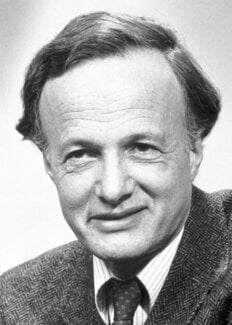John C. Polanyi
Biographical

John Charles Polanyi was born in 1929 in Berlin, Germany, of Hungarian parents, Michael and Magda Elizabeth Polanyi. The family moved to England in 1933 where he received his education.
His University training was at Manchester University, where he obtained his B.Sc. in 1949, and his Ph.D. in 1952.
From 1952-1954, he was a Postdoctoral Fellow at the National Research Council Laboratories in Ottawa, Canada, and from 1954-1956 Research Associate at Princeton University.
In 1956, John Polanyi was appointed as a Lecturer at the University of Toronto where he was successively Assistant Professor (1957-1960), Associate Professor (1960-1962) and Professor (1962- present). He was given the (honorific) title University Professor in January 1974.
In 1958, he married Anne (Sue) Ferrar Davidson. They have two children, Margaret Alexandra (born 1961), and Michael Ferrar (born 1963).
He serves on the Board of the Ontario Laser and Lightwave Research Centre, Canada (1988-present), is a Member of the Board of the Steacie Institute for Molecular Sciences, Canada (1991-present), and Member of the Science Advisory Board, Max Planck Institute for Quantum Optics, Germany (1982-present), and is Honorary Consultant to the Institute for Molecular Science, Okazaki, Japan (1989-1992). He was a Founding Member and is currently President of the Canadian Committee of Scientists and Scholars, and also was a Founding Member of The Royal Society of Canada Committee on Scholarly Freedom, a Member of the American Academy of Arts and Science Committee on International Security Studies, and a Member of the Board of the Canadian Centre for Arms Control and Disarmament to which he is currently an Advisor.
He was awarded the Marlow Medal of the Faraday Society 1962, Centenary Medal of the British Chemical Society 1965, the Steacie Prize for Natural Sciences (shared with N. Bartlett) 1965, the Noranda Award of the Chemical Institute of Canada 1967, the Henry Marshall Tory Medal of the Royal Society of Canada 1977, the Wolf Prize in Chemistry (shared with G. Pimentel) 1982, the Izaak Walton Killam Memorial Prize 1988, the Royal Medal of the Royal Society of London 1989, and the John C. Polanyi Lecture Award of the Canadian Society for Chemistry 1992.
He is a Fellow of the Royal Society of Canada (1966), and the Royal Society of London (1971), a Member of the American Academy of Arts and Sciences, (1976), the U.S. National Academy of Sciences (1978), the Pontifical Academy of Rome (1986), a Fellow of the Royal Society of Edinburgh (1988), an Honorary Fellow of the Royal Society of Chemistry of the United Kingdom (1991), and of the Chemical Institute of Canada (1991).
He has been the recipient of honorary degrees from the Universities of Waterloo 1970; Memorial 1976; McMaster 1977; Trent 1977; Carleton 1981; Harvard 1982; Dalhousie 1983; Rensselaer 1984; Brock 1984; St. Francis Xavier 1984; Lethbridge 1987; Victoria 1987; Ottawa 1987; Sherbrooke 1987; Laval 1987; York 1988; Manchester, England 1988; Montreal 1989, Acadia 1989; Weizmann Institute, Israel 1989; Bari, Italy 1990; British Columbia 1990; Concordia 1990, McGill 1990 and Queen’s 1992.
He was made an Officer of the Order of Canada in 1974, and a Companion of the Order of Canada in 1979.
In addition to his scientific papers he has published approximately one hundred articles on science policy, on the control of armaments and the impact of science on society. He has produced a film ‘Concepts in Reaction Dynamics’ (1970), and has co-edited a book, ‘The Dangers of Nuclear War’ (1979)
This autobiography/biography was written at the time of the award and later published in the book series Les Prix Nobel/ Nobel Lectures/The Nobel Prizes. The information is sometimes updated with an addendum submitted by the Laureate.
Nobel Prizes and laureates
Six prizes were awarded for achievements that have conferred the greatest benefit to humankind. The 12 laureates' work and discoveries range from proteins' structures and machine learning to fighting for a world free of nuclear weapons.
See them all presented here.
